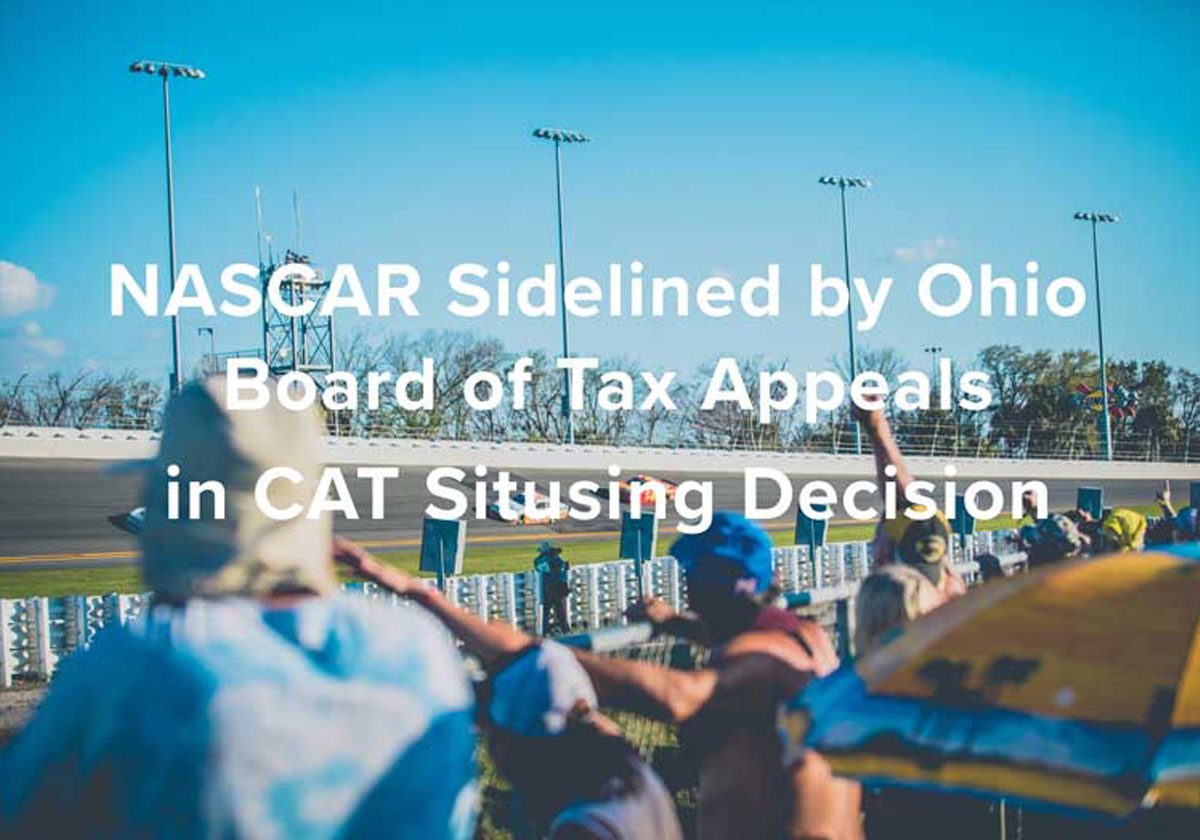A recent Ohio Board of Tax Appeals (“Board”) decision provides a classic tale of you win one, you lose one. On April 5, 2021, the Board held that broadcast and media revenue earned by NASCAR was intellectual property within R.C. 5751.033(F) as NASCAR contended but found that the Tax Commissioner’s situsing of a portion of the revenue to Ohio based on a third-party resource was appropriate. NASCAR Holdings, Inc. v. McClain, No. 2015-263.
NASCAR is a Florida headquartered and domiciled company. It was not filing Commercial Activity Tax (“CAT”) returns in Ohio and was identified for audit. During the five-year audit period, NASCAR had seven NASCAR-sanctioned events in Ohio. NASCAR races are broadcast in more than 150 countries.
The Tax Commissioner considered seven types of receipts: broadcast revenue (agreements with media outlets to air NASCAR sanctioned races), media revenue (where NASCAR property could be used in marketing efforts), license fees, sponsor fees, sanction fees (receipts from race promoters), membership revenue (valid membership is required for every competitor, track official, and promotor) and competition revenue (charges to race teams for inspection fees at race events). The Tax Commissioner sitused the broadcast and media revenue using the ratio of Ohio cable televisions to total cable televisions in the United States as reported by Nielson Ratings Service. The license and sponsor fees were sitused based on Ohio population. Sanction fees, membership revenue, and competition revenue were sitused based on the location of the race event for which they were paid. Other than the sanction fees, NASCAR argued that none of the revenue was sitused to Ohio. Instead, NASCAR argued that all of these types of revenue should be sitused to its commercial domicile in Florida. Perhaps in an effort to avoid diluting that argument, NASCAR provided no other evidence to refute the Tax Commissioner’s situsing methodology or to provide a more accurate situsing methodology based on use.
Setting aside the constitutional issues, the Board first considered the broadcast revenue and NASCAR’s argument that R.C. 5751.033(I) only applies to services and was, therefore, not applicable to intellectual property, such as the broadcast revenue, and that broadcasting revenue should instead by sitused based on R.C. 5751.033(F), which relates to intellectual property. The Board disagreed that R.C. 5751.033(I) only applies to services due to the catch-all language that provides “all other gross receipts not otherwise sitused” but the Board agreed that R.C. 5751.033(F) applied to the broadcast rights based on the legal agreements, which referenced the intangible assets as intellectual property.
R.C. 5751.033(F) situses receipts from intellectual property based on the payor’s use or right to use. The Board determined that NASCAR’s situsing of all the revenue to its commercial domicile was unreasonable: “NASCAR’s situsing focuses on the benefit that it receives and the location where it receives such benefit rather than the use, or right to use, of the purchaser. * * * NASCAR does not dispute that FOX was granted the right to use NASCAR’s intellectual property in Ohio. Yet, NASCAR’s situsing ignores the link to Ohio based on FOX’s right to use the broadcasting right in the state pursuant to that agreement.”
The Board then addressed NASCAR’s arguments that the use of the ratio of Ohio cable televisions to total U.S. cable televisions or the ratio of the Ohio to U.S. population overstated the Ohio sitused receipts. The Board held it would not find that the Tax Commissioner’s situsing was inaccurate because NASCAR failed to provide state specific ratings information even though it was available. Likewise, the Board rejected NASCAR’s claim that a portion of the rights were used outside of the United States, even though the agreements clearly provided such rights, finding that the Tax Commissioner used the best information available to him. Although not explicit in the decision, the Board essentially held that NASCAR failed to meet its burden of proving that the Tax Commissioner’s situsing was inaccurate or even overstated by providing sufficient evidence of either the inaccuracies in the Tax Commissioner’s situsing method or providing evidence of an alternative reasonable method. The Board declined to remand the case back to the Tax Commissioner due to the change in governing statutory provision from R.C. 5751.033(I) to 5751.033(F) since the Board ultimately determined that the Tax Commissioner’s situsing methodology was reasonable under the latter section.
Finally, the Board held that NASCAR failed to show that the Tax Commissioner abused his discretion with regard to the amount of penalty assessed: “In order to have an ‘abuse’ in reaching such determination, the result must be palpably and grossly violative of fact and logic that it evidences not the exercise of will but perversity of will, not the exercise of judgement but defiance therefore, not the exercise of reason but rather of passion or bias.” The Board determined that there was no evidence that the Tax Commissioner abused his discretion.
NASCAR has 30 days to appeal the decision to the Ohio Supreme Court. One potential area for appeal would be the argument that the Tax Commissioner’s situsing is based on the purchaser’s (FOX) use in a subsequent sale (i.e., the sale to the cable subscriber) and that information is not reflective of the purchaser’s (FOX) benefit (see Defender Sec. Co. V. McClain, Slip Opinion No. 2020-Ohio-4594). Since NASCAR does not appear to have provided evidence of the purchaser’s (FOX) benefit (or at least the Board determined so), such an argument may also fail based on lack of evidence. If the Board’s decision is not appealed and reversed, the decision likely indicates that the situsing of intellectual property wholly outside of Ohio will probably not be sustained where there is evidence that the payor has some right to use those intellectual property rights in Ohio.
If you would like to know more about situsing issues and intellectual property, please contact Debora (Dardinger) McGraw or any other ZHF professional.


